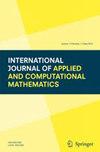Analysis of MHD Fluid Flow and Heat Transfer Inside an Inclined Deformable Filter Chamber: Lie Group Method
International Journal of Applied and Computational Mathematics
Pub Date : 2023-09-17
DOI:10.1007/s40819-023-01581-9
引用次数: 0
Abstract
Abstract This paper investigates MHD fluid flow and distribution of heat inside a filter chamber during a process of filtering particles from the fluid. A flow model of MHD viscous incompressible fluid inside a filter is studied to seek semi-analytical solutions which are analysed to find flow and heat dynamics that lead to optimal outflow (maximum filtrates) during filtration. Lie group method is used to reduce a system of four partial differential equations describing fluid flow and temperature distribution inside the filter chamber to a system of two ordinary differential equations. The reduced system is then solved by perturbation process to obtain semi-analytical solutions for flow velocity and temperature variation inside the chamber. To understand the flow dynamics and heat distribution of the underlying case study better, the influence of different parameters during filtration resulting from the filter design, flow dynamics and heat effects are graphically presented and analysed in order to identify a combination of flow parameters that yields the best filtration process. The findings show that to maximise filtrates production, more fluid injection is required during filtration. Moreover, from the findings, it is evident that the temperature increase inside the chamber arising from the Joule heating effect is ideal since it increases internal work done and hence increases filtrates production.倾斜变形过滤腔内MHD流体流动与传热分析:李群法
摘要:本文研究了MHD流体在过滤颗粒过程中滤腔内的流动和热量分布。研究了MHD黏性不可压缩流体在过滤器内部的流动模型,寻求半解析解,并对其进行了流动和热动力学分析,从而得到过滤过程中最优流出量(最大滤液量)。利用李群法将描述过滤腔内流体流动和温度分布的四个偏微分方程组简化为两个常微分方程组。然后用微扰法求解简化后的系统,得到腔内流速和温度变化的半解析解。为了更好地了解潜在案例研究的流动动力学和热量分布,在过滤过程中,由过滤器设计、流动动力学和热效应引起的不同参数的影响以图形形式呈现和分析,以确定产生最佳过滤过程的流动参数组合。研究结果表明,为了使滤液产量最大化,在过滤过程中需要注入更多的流体。此外,从研究结果来看,焦耳热效应引起的室内温度升高显然是理想的,因为它增加了内部做功,从而增加了滤液的产生。
本文章由计算机程序翻译,如有差异,请以英文原文为准。
求助全文
约1分钟内获得全文
求助全文
来源期刊

International Journal of Applied and Computational Mathematics
Mathematics-Applied Mathematics
CiteScore
3.40
自引率
0.00%
发文量
263
 求助内容:
求助内容: 应助结果提醒方式:
应助结果提醒方式:


